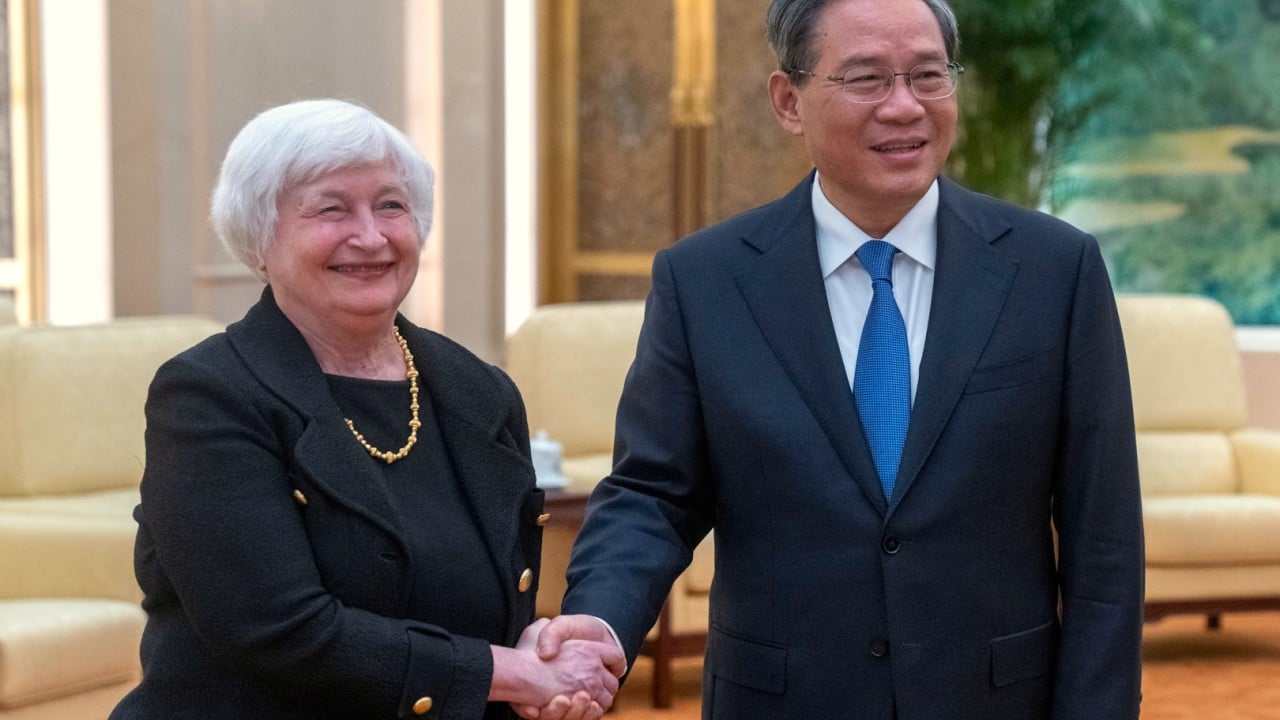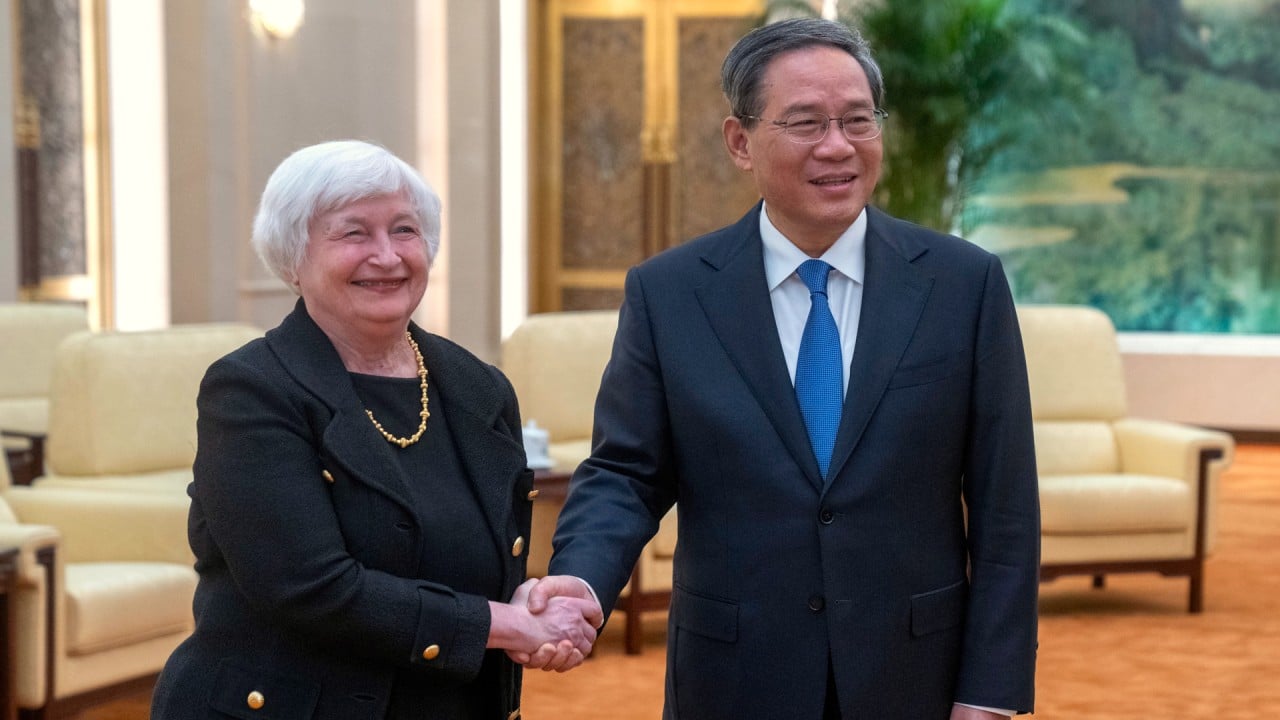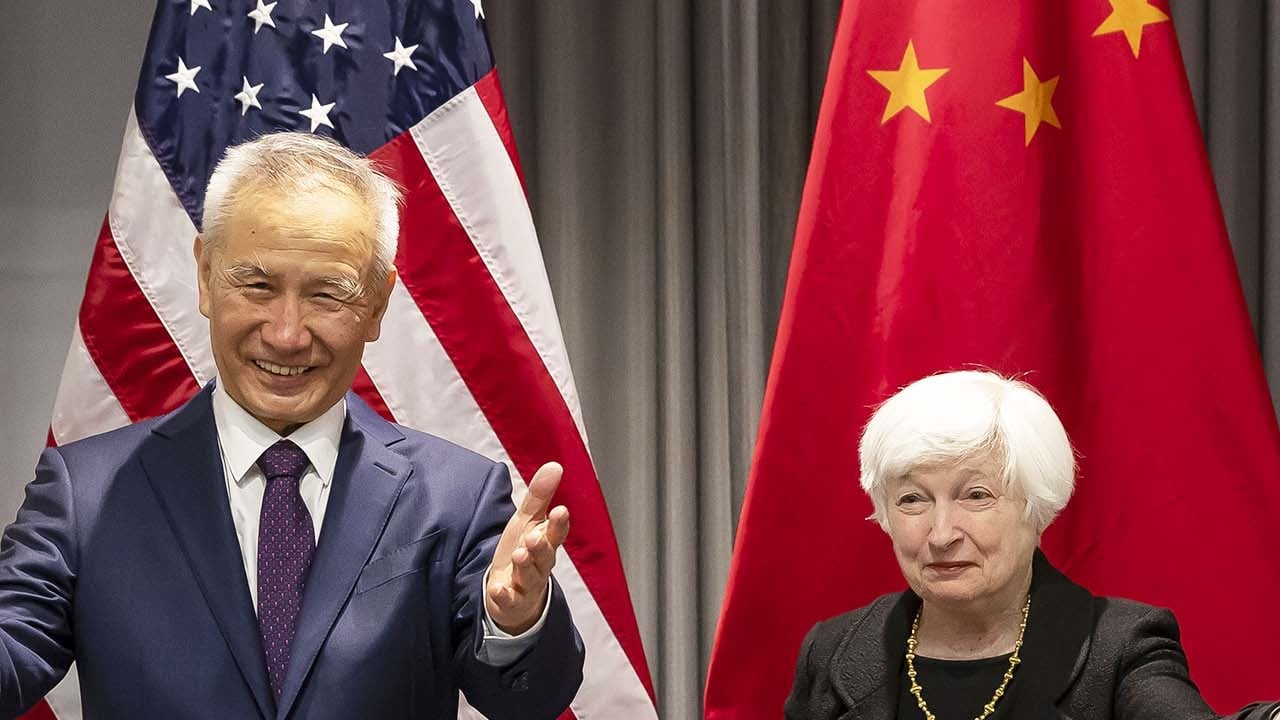China’s EV sector a live wire for US, with war of words over excess capacity casting shadow over Janet Yellen visit
United States Treasury Secretary Janet Yellen is expected to consult American companies on China’s industrial overcapacity, particularly in solar power and electric vehicles (EVs), at a planned meeting during her trip to China next week – a discussion that is likely to inform the tone of subsequent talks with her counterparts in Beijing, as both sides have deployed heated rhetoric on the issue.
The town hall-style meeting will last for one and a half hours in the early afternoon of April 5 according to information obtained by the Post, twice as long as the 45 minutes previously reported. The gathering is tentatively set to take place in the southern metropolis of Guangzhou, at the Art Institute of the Orient on the city’s Shamian Island.
Yellen’s trip comes months ahead of November’s US presidential election, when bilateral tensions are on the rise. Overcapacity appears to be a new battleground in the broader conflict – Washington has taken action to curb Chinese EV imports, and Beijing recently lodged a complaint to the World Trade Organization against what it termed “discriminatory” subsidies designed to exclude its manufacturers.
On Wednesday, Yellen addressed the issue at a solar cell factory in Norcross, Georgia. “I will convey my belief that excess capacity poses risks not only to American workers and firms and to the global economy, but also to productivity and growth in the Chinese economy.”
She pledged to “press my Chinese counterparts to take necessary steps to address this issue” and create a “level playing field” for American companies and workers.
After her Guangzhou sojourn, Yellen will head to Beijing to meet with high-ranking economic officials, most likely Vice-Premier He Lifeng, commerce minister Wang Wentao and central bank governor Pan Gongsheng.
China’s overcapacity has already wrecked too many industries in America over the past two decades
Yellen, a former chair of the Federal Reserve, has many years of experience dealing with Chinese officials over her tenure in public office, including rounds of dialogue with former vice-premier Liu He on macroeconomic and financial issues.
Her April visit is presumed to be in conjunction with the fourth meeting of the bilateral economic and financial working group formed late last year, as no public reports have suggested the previous three meetings featured any major quarrels.
But with excess capacity already a sore subject for many in the foreign business community, that relative peace may not last.
“China’s overcapacity has already wrecked too many industries in America over the past two decades,” said Scott Paul, president of the Alliance for American Manufacturing, a non-profit organisation jointly founded by American manufacturers and the United Steelworkers trade union in 2007.
“It’s critical that the [Joe Biden] administration and Congress proactively deploy existing trade tools and develop new ones to prevent job losses before it’s too late.”
That process seems to have already begun, generating friction in the bilateral relationship while also dampening China’s prospects for another year of blockbuster growth buoyed by the global green energy transition.
In a late February statement, the White House had strong language on the topic, labelling a potential glut of Chinese EVs as a looming threat. “China’s policies could flood our market with its vehicles,” it said, “posing risks to our national security”.
As US, EU anxiety grows, will overcapacity curb exports of China’s ‘new three’?
As US, EU anxiety grows, will overcapacity curb exports of China’s ‘new three’?
The US government has already excluded Chinese EV batteries, battery materials or vehicles containing either from tax credits or subsidies under restrictions for “foreign entities of concern”, a designation China shares with Russia, Iran and North Korea.
The European Union has also begun its own anti-subsidy probe covering Chinese EV exports, which could be a precursor to double-digit punitive tariffs.
Beijing has spoken out emphatically against what it considers the politicisation of trade, firing verbal warning shots ahead of Yellen’s trip.
In a long commentary piece published on Monday, state news agency Xinhua lambasted some Western institutions for spreading fears of overcapacity in three products seen as drivers of exports and economic growth – solar panels, EVs and lithium batteries.
“The US-led West is exploiting its hegemony to strangle China’s efforts to move up the value chain and maintain dominance in the global economic system,” it said.
Foreign ministry spokesman Lin Jian said Thursday that China’s new energy sector has thrived through the quality of its products and innovation in an atmosphere of global competition, rather than through subsidies and protectionism.
“It is the responsibility of all sides, including the US, to protect the supply chain and oppose hegemony,” Lin said.
As the war of words rages, analysts said such tit-for-tat exchanges reflect a set of shared priorities – and a shared desire for an object of blame.
“Observers often miss the commonality in the ‘economic security’ thinking adopted by the US, EU and China: import substitution,” said Zha Daojiong, a professor at Peking University’s School of International Studies.
Furthermore, he said, each expansion of restrictions can be justified by one side insisting that the other party is the instigator. “That modus operandi is likely to continue.”
Others said this latest dispute could serve as a serious flashpoint, with a careful management of differences necessary to ensure an already damaged relationship does not deteriorate further.
Pang Zhongying, a chair professor in international political economy at Sichuan University, was less than rosy about the likelihood of reconciliation. The Biden administration’s restrictive measures were “obvious and visible”, he said, adding they indicated the “great divergence” between the China and US markets can be expected to continue over the next few years.




